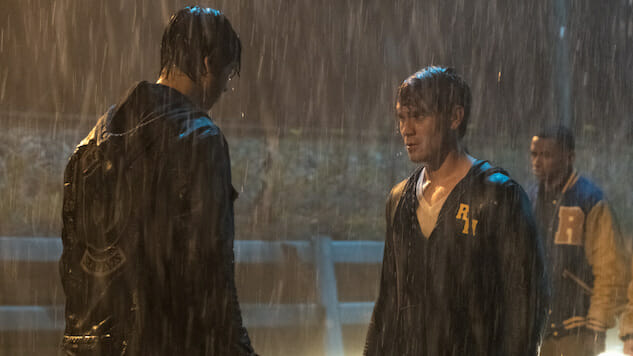When Did Riverdale Get So Damn Serious?
Photo: Katie Yu/The CW
In Riverdale’s Season Two premiere, after the as-yet-unmasked marauder known as the Black Hood guns down Fred Andrews (Luke Perry), his beautiful lunkhead of a son, Archie (KJ Apa), frets over his father in a hospital waiting room. The gang’s together, for what turns out to be one of few such occasions in series’ exasperatingly dour sophomore run: His girlfriend, Veronica Lodge (Camila Mendes); his neighbor, Betty Cooper (Lili Reinhart); and his longtime pal, Jughead Jones (Cole Sprouse), the last tasked, as usual, with commenting on the proceedings—and so explaining how The CW’s teen soap lost its fine Season One form. “If you keep this up, you’re gonna need a superhero name,” he says, referring to Archie saving his father’s life and Cheryl Blossom’s (series MVP Madelaine Petsch) in quick succession. “Like Pureheart the Powerful.”
As if to fall in line with the network’s caped crusaders—Arrow, DC’s Legends of Tomorrow, Supergirl, The Flash—Riverdale, developed by Roberto Aguirre-Sacasa from the Archie Comics, has misspent an inordinate amount of time this season trying to transform the dullard at its center into a sort of late-adolescent Punisher. In this vein, Veronica describes Archie’s tale of taking responsibility through dog ownership as “the cutest origin story ever”; his bunch of buff high-school vigilantes, The Red Circle, cribs its name from a comic book; the Black Hood himself, the self-styled redeemer of Riverdale’s sins, promises a purifying “bloodletting” that screams supervillain as much as it does serial killer. Archie even has his own Alfred: a bespectacled figure named Dilton Doiley (Major Curda), procuring a pistol for his simpleton liege before slinking back into the shadows.
Of course, Riverdale has always featured a dizzying array of genre influences: I described the first season as “Twin Peaks [meets] Gossip Girl with a comic book kiss,” and I meant it as high praise. The problem with this approach is the delicate balance it requires, which Archie’s heroics (and the dreadfully half-baked Serpents-versus-Ghoulies subplot, and the fast-abandoned “Dark Betty” arc, and the reduction of Marisol Nichols’ Hermione Lodge to a nagging Mommie Dearest muttering “Mija!” every time Veronica opens her mouth) disrupt to such an extent that the only reasonable response is to quote The Dark Knight: “Why so serious?” Riverdale, as it happens, is not a series that benefits from the mirthless influence of Christopher Nolan’s trilogy—or, for that matter, most Marvel and DC adaptations to appear in recent years. After all, this is the series that made Jason Blossom’s memorial service into his poison-tongued twin sister’s jaw-dropping one-woman show. (Tag yourself: I’m Casey Cott’s Kevin Keller whispering “Yes!” as she marches toward the casket in wedding-day white.) Riverdale’s debut season succeeded because the series used its “Who Killed Laura Palmer?”-esque mystery as kindling, there to set alight the real drama on screen—schoolyard sniping, not-so-innocent flirtations, and most especially the delicious excess of its aesthetic, from Cheryl’s preposterous wardrobe to the neon glow of Pop’s Chock’lit Shoppe.
-

-

-

-

-

-

-

-

-

-

-

-

-

-

-

-

-

-

-

-

-

-

-

-

-

-

-

-

-

-

-

-

-

-

-

-

-

-

-

-








































